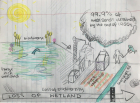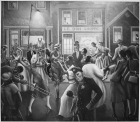World 1901-present
Some of the most profound and influential changes in world history take place from 1901 to today and covered here are many of the important and well known ones as well as some of the smaller stories. In terms of reach this section covers huge themes on diplomacy, post imperialism and economics. The articles cover the time period right up into recent events such as the State of the Union address by the US President Barrack Obama.
Sort by:
Date (Newest first) | Title A-Z
Show:
All |
Articles |
Podcasts |
Multipage Articles
-

Film: Brezhnev's early life and career
ArticleClick to view -

Establishing a dialogue with Year 9 about why environmental history matters
ArticleClick to view -

Film: Lenin's early thought
ArticleClick to view -

Tracing the popular memory of Rosa Parks with Year 9
ArticleClick to view -

Shaping what matters: Year 9 decide why we should care about the Windrush scandal
ArticleClick to view -

Films: Khrushchev – Interpretations
9th October 2024Click to view -

Film series: Power and authority in Russia and the Soviet Union
13th August 2024Click to view -

The Olympics - politics, impact and legacy - its not just about the sport
ArticleClick to view -

Lengthening Year 9’s narrative of the American civil rights movement
ArticleClick to view -

Come together: putting popular music at the heart of historical enquiry
ArticleClick to view -

Films: Boris Yeltsin – Interpretations
19th June 2024Click to view -

Film: Stalin - Early Life
ArticleClick to view -

Films: Mikhail Gorbachev – Interpretations
ArticleClick to view -

Recorded webinar series: Commemorating the 75th anniversary of the UN Convention on Genocide
Multipage ArticleClick to view -

How representing women can convey a more complex narrative of the Russian Revolution to Year 9
ArticleClick to view -

Recorded Webinar: ‘Drawing the Line’: the 1947 Partition of India
ArticleClick to view -

Recorded Webinar: India and the Second World War
ArticleClick to view -

Recorded Webinar: Resisting Reagan
ArticleClick to view -

Film: Rethinking the origins of the Cold War
ArticleClick to view -

Film series: The African-American Civil Rights Movement
ArticleClick to view

